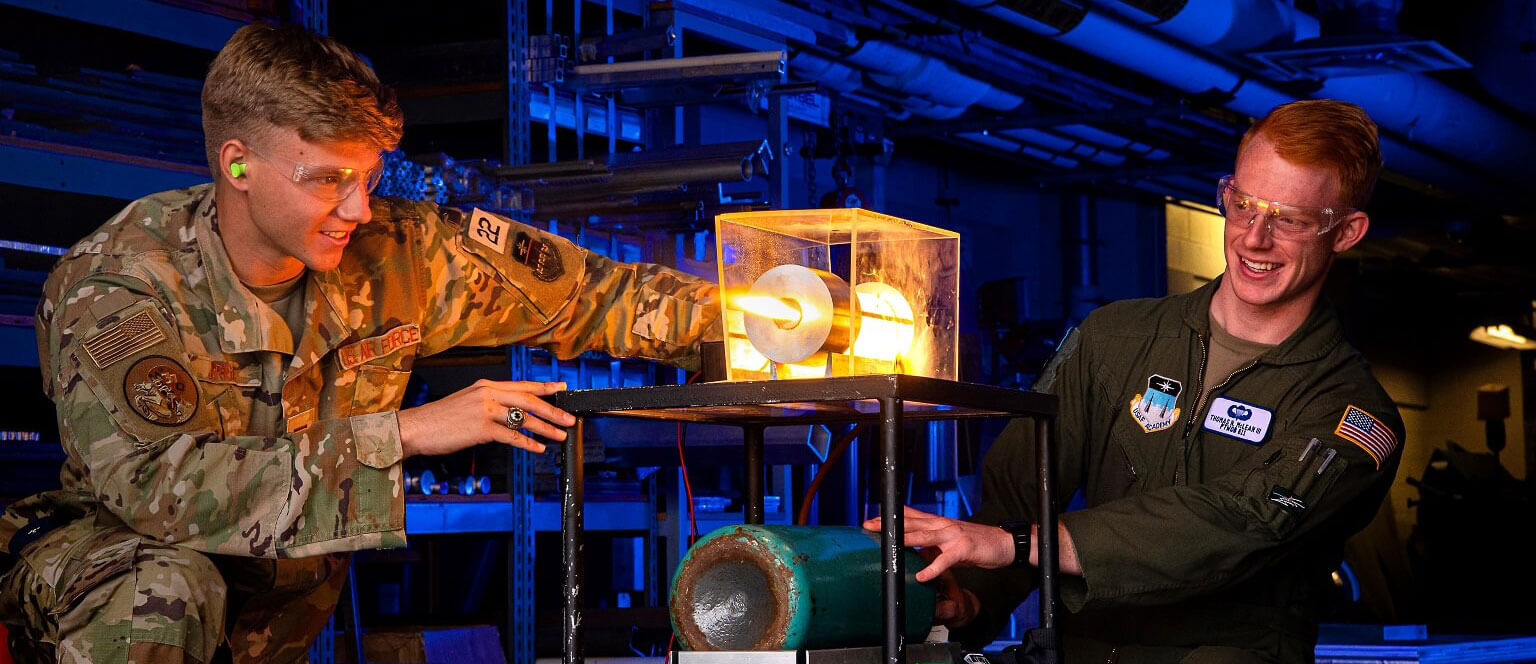Astronautical Engineering

Cadets learn the fundamentals of satellites, rockets, and other space systems as well as how to design them to contribute to our national security and economy. This experience is enhanced by senior capstone projects and independent and sponsored research opportunities with a variety of government and industry partners.
In 1958, the same year NASA was formed, the Department of Astronautics was established at the U.S. Air Force Academy. Our cadets are rocket scientists, and our motto is “Learning Space by Doing Space.” We have designed, built, and launched rockets to the edge of space. We have designed and built satellites that are currently in Earth orbit and are fully funded by Air Force Research Laboratory to do the same with two more satellites over the next three years. Our cadets, from fourth year to first year, operate our ground station, controlling satellites that contribute to our national security and our understanding of the space environment. Our graduates are now conducting space-related research, acquiring our next generation of space systems, and operating our current space assets in defense of the nation.
Our program is the best in the country, as the #1 Aeronautical / Astronautical program on the 2017 U.S. News Best Colleges list.
Potential Job Assignments
Within the Air Force
| Outside the Air Force
|
Approximately 50% of Astronautical Engineering graduates go on to become pilots while the other half go to Acquisition or Developmental Engineering duties; 30% pursue a Master’s Degree immediately after graduation (with follow-on pilot training for many); and 20% engineering jobs.
SAMPLE COURSES
- Astrodynamics
- Rocket Propulsion
- Space Mission Design
- Small Spacecraft Engineering
SUGGESTED COURSE SEQUENCE
| 4-DEGREE (FRESHMAN) | 3-DEGREE (SOPHOMORE) | 2-DEGREE (JUNIOR) | FIRSTIE (SENIOR) |
|---|---|---|---|
| Beh Sci 110 Chem 100 Com Sci 110 English 111 For Lang 1 For Lang 2 History 100 Math 141 Math 142 Physics 110 | Astro Engr 201 Astro Engr 310 Chem 200 ECE 315 English 211 Mech Engr 220 Mech Engr 320 Econ 201 Math 243 Math 245 MSS 251 Physics 215 Aero Engr 241 | Astro Engr 321 Astro Engr 331 Astro Engr 351 Law 220 Engr 341 Engr 342 Mech Engr 330 Philos 310 Math 346 Math 356 /377 Pol Sci 211 | Adv Sociocultural Opt Aero Engr 315 Astro Engr 445 Astro 436 Astro 437 Astro 332 History 300 Soc Sci 311 Space Environment Opt |
ACCREDITATION INFORMATION
The Astronautical Engineering degree is accredited by the Engineering Accreditation Commission of ABET, www.abet.org.
To ensure the success of our graduates, we prepare them to achieve the following Program Educational Objectives within two to five years after graduation:
- Recognition as successful Air Force officers through demonstration of their ability to:
- Rapidly acquire required knowledge
- Lead others effectively
- Apply ethical and moral standards
- Improve unit performance by application of organizational skills
- Make sound decisions based on critical thinking
- Communicate effectively
- Selection for career training on, or ahead of, schedule, and for a progression of assignments of increasing responsibility
- Demonstrated ability to solve Air Force technical problems
- Success in continuing education
These objectives are assessed through Student Outcomes—the skills, knowledge and behaviors students should acquire before graduation. The outcomes for this program are:
- an ability to identify, formulate, and solve complex engineering problems by applying principles of engineering, science, and mathematics
- an ability to apply engineering design to produce solutions that meet specified needs with consideration of public health, safety, and welfare, as well as global, cultural, social, environmental, and economic factors
- an ability to communicate effectively with a range of audiences
- an ability to recognize ethical and professional responsibilities in engineering situations and make informed judgments, which must consider the impact of engineering solutions in global, economic, environmental, and societal contexts
- an ability to function effectively on a team whose members together provide leadership, create a collaborative and inclusive environment, establish goals, plan tasks, and meet objectives
- an ability to develop and conduct appropriate experimentation, analyze and interpret data, and use engineering judgment to draw conclusions
- an ability to acquire and apply new knowledge as needed, using appropriate learning strategies
CONTACT US
Dr. Robert Brown
Advisor-in-Charge
robert.brown@afacademy.af.edu
(719) 333-4454